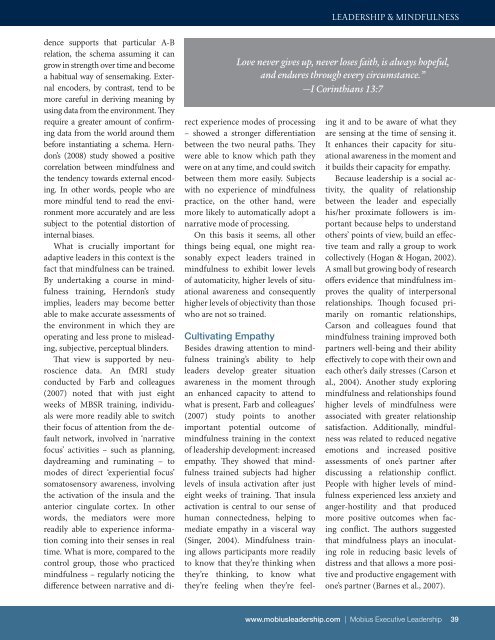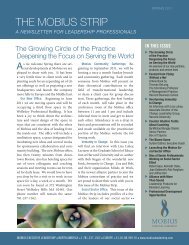Leadership & Mindfulness - Mobius Executive Leadership
Leadership & Mindfulness - Mobius Executive Leadership
Leadership & Mindfulness - Mobius Executive Leadership
Create successful ePaper yourself
Turn your PDF publications into a flip-book with our unique Google optimized e-Paper software.
LEADERSHIP & <strong>Mindfulness</strong>Love never gives up, never loses faith, is always hopeful,and endures through every circumstance.”—I Corinthians 13:7dence supports that particular A-Brelation, the schema assuming it cangrow in strength over time and becomea habitual way of sensemaking. Externalencoders, by contrast, tend to bemore careful in deriving meaning byusing data from the environment. Theyrequire a greater amount of confirmingdata from the world around thembefore instantiating a schema. Herndon’s(2008) study showed a positivecorrelation between mindfulness andthe tendency towards external encoding.In other words, people who aremore mindful tend to read the environmentmore accurately and are lesssubject to the potential distortion ofinternal biases.What is crucially important foradaptive leaders in this context is thefact that mindfulness can be trained.By undertaking a course in mindfulnesstraining, Herndon’s studyimplies, leaders may become betterable to make accurate assessments ofthe environment in which they areoperating and less prone to misleading,subjective, perceptual blinders.That view is supported by neurosciencedata. An fMRI studyconducted by Farb and colleagues(2007) noted that with just eightweeks of MBSR training, individualswere more readily able to switchtheir focus of attention from the defaultnetwork, involved in ‘narrativefocus’ activities – such as planning,daydreaming and ruminating – tomodes of direct ‘experiential focus’somatosensory awareness, involvingthe activation of the insula and theanterior cingulate cortex. In otherwords, the mediators were morereadily able to experience informationcoming into their senses in realtime. What is more, compared to thecontrol group, those who practicedmindfulness – regularly noticing thedifference between narrative and directexperience modes of processing– showed a stronger differentiationbetween the two neural paths. Theywere able to know which path theywere on at any time, and could switchbetween them more easily. Subjectswith no experience of mindfulnesspractice, on the other hand, weremore likely to automatically adopt anarrative mode of processing.On this basis it seems, all otherthings being equal, one might reasonablyexpect leaders trained inmindfulness to exhibit lower levelsof automaticity, higher levels of situationalawareness and consequentlyhigher levels of objectivity than thosewho are not so trained.Cultivating EmpathyBesides drawing attention to mindfulnesstraining’s ability to helpleaders develop greater situationawareness in the moment throughan enhanced capacity to attend towhat is present, Farb and colleagues’(2007) study points to anotherimportant potential outcome ofmindfulness training in the contextof leadership development: increasedempathy. They showed that mindfulnesstrained subjects had higherlevels of insula activation after justeight weeks of training. That insulaactivation is central to our sense ofhuman connectedness, helping tomediate empathy in a visceral way(Singer, 2004). <strong>Mindfulness</strong> trainingallows participants more readilyto know that they’re thinking whenthey’re thinking, to know whatthey’re feeling when they’re feelingit and to be aware of what theyare sensing at the time of sensing it.It enhances their capacity for situationalawareness in the moment andit builds their capacity for empathy.Because leadership is a social activity,the quality of relationshipbetween the leader and especiallyhis/her proximate followers is importantbecause helps to understandothers’ points of view, build an effectiveteam and rally a group to workcollectively (Hogan & Hogan, 2002).A small but growing body of researchoffers evidence that mindfulness improvesthe quality of interpersonalrelationships. Though focused primarilyon romantic relationships,Carson and colleagues found thatmindfulness training improved bothpartners well-being and their abilityeffectively to cope with their own andeach other’s daily stresses (Carson etal., 2004). Another study exploringmindfulness and relationships foundhigher levels of mindfulness wereassociated with greater relationshipsatisfaction. Additionally, mindfulnesswas related to reduced negativeemotions and increased positiveassessments of one’s partner afterdiscussing a relationship conflict.People with higher levels of mindfulnessexperienced less anxiety andanger-hostility and that producedmore positive outcomes when facingconflict. The authors suggestedthat mindfulness plays an inoculatingrole in reducing basic levels ofdistress and that allows a more positiveand productive engagement withone’s partner (Barnes et al., 2007).www.mobiusleadership.com | <strong>Mobius</strong> <strong>Executive</strong> <strong>Leadership</strong> 39



